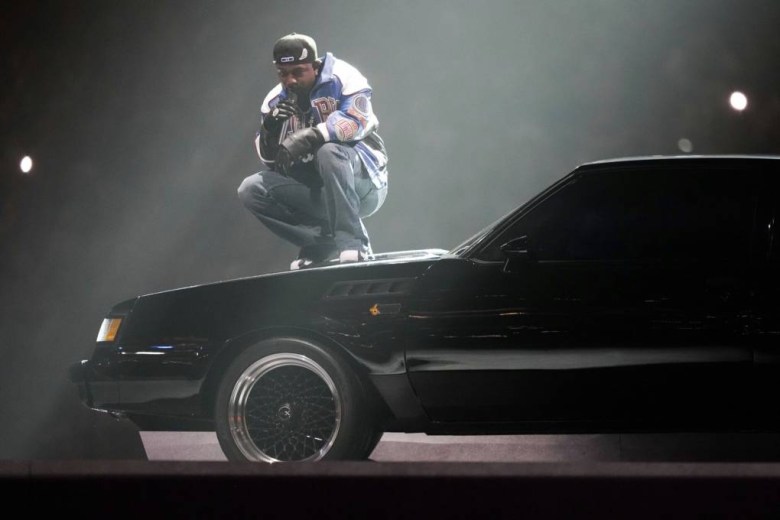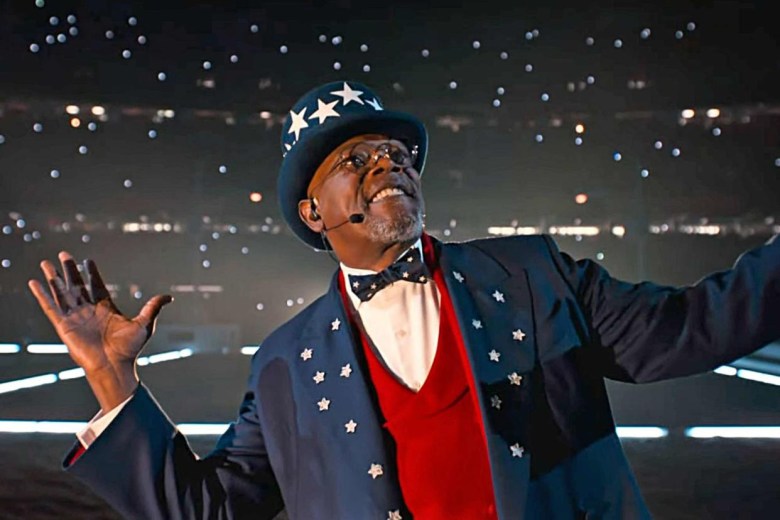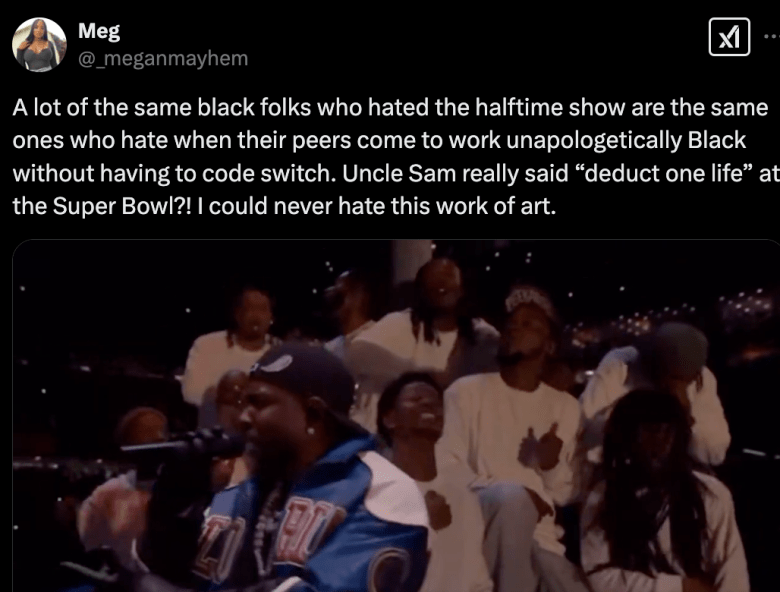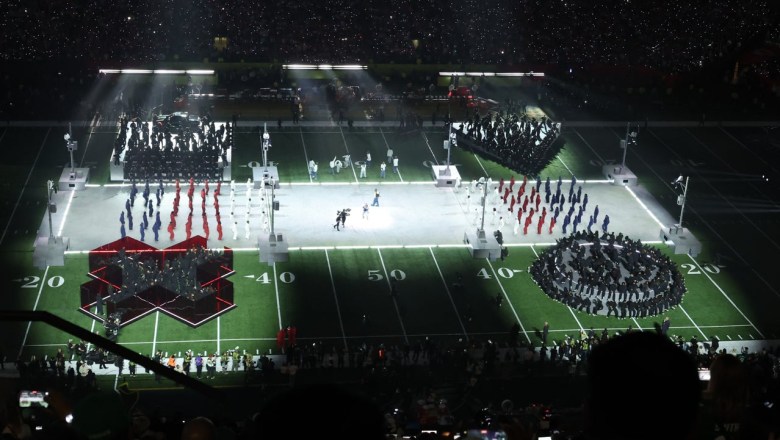Kendrick Lamar‘s Super Bowl LIX halftime show made a powerful statement regarding his ongoing beef with Drake and issues surrounding America.
At 37 years old, the 22-time Grammy-winning artist became the first solo rap artist to perform at the Super Bowl, and he did not disappoint. As the lights dimmed in New Orleans’s Caesars Superdome, viewers and fans eagerly anticipated one of the most awaited Super Bowl performances ever, especially given the nearly year-long feud, numerous Grammy wins, and pending lawsuit.
However, no one was prepared for the 13-minute performance to serve as a thought-provoking exploration of America’s contradictions, cultural power dynamics, and racial inequalities faced by Black people.

The Compton, CA native is well-known for the impact of his words. His 2017 album, DAMN., won a Pulitzer Prize for its “affecting vignettes capturing the complexity of modern African-American life.” Yet Sunday’s performance felt like a disgruntled letter to America from a Black man, delivered during Black History Month on one of the grandest stages available.
As discussions and analyses of Lamar’s performance continue, here are some key highlights we didn’t want you to miss.
Uncle Samuel L. Jackson
The symbolism began early in the Super Bowl halftime performance when Lamar recruited the legendary actor Samuel L. Jackson to portray Uncle Sam. Throughout the show, the Academy Award-winning actor gave voice to the commercialization of Black culture while also diminishing and mocking Black people.
Wearing a star-covered red, white, and blue suit, Jackson opened the show with, “Salutations, it’s your Uncle Sam, and this is the great American game.”

During his time as emcee, he antagonized Lamar for not adhering to the confines of a respectable performance, accusing the artist of being “too loud and too ghetto.” He then questioned whether Lamar truly knew “how to play the game.”
Lamar’s slowed-down rendition of “Man at the Garden” included a moment where he and performers dressed in white t-shirts were “hanging out” under a streetlight. Jackson’s imposing Uncle Sam character interrupted, saying, “Oh, you brought your friends with you, the old cultural cheat code. Scorekeeper, deduct one life.”
Jackson’s role as Uncle Sam mirrored his portrayal of Dolmedes in Spike Lee’s Chi-Raq.

While he has been revered as an actor for over 50 years, many are unaware of Jackson’s involvement in the Civil Rights movement. While attending Morehouse College in Atlanta, he actively supported Martin Luther King Jr.
After King’s assassination in 1968, Jackson served as an usher at his funeral and continued the fight for civil rights by traveling to Memphis to participate in several protests for equality. He was even suspended from Morehouse after holding administrators and trustees hostage due to their lack of inclusive curricula and policies.
Following that, he moved to California, where he formed relationships with Stokely Carmichael and H. Rap Brown, both of whom were members of the Black Panther Party.
If anyone understands the true dichotomy between Black people and America’s treatment of them, it is Samuel L. Jackson.
The Red, White, and Blue
The colors of the American flag were prominent throughout the entire performance, including Lamar’s custom Martine Rose jacket and the colors worn by his dancers and special guests SZA and Serena Williams.
As the dancers periodically formed the flag, the expression of patriotism once again highlighted America’s contradictions. How can a country that uses freedom as its main calling card openly oppress Black people?
The choreography and visuals made references to mass incarceration, reparations, and the concept of revolution, all intended to reveal the brutal nature of the so-called American “dream.”
The emphasis on the flag’s representation was heightened when a performer revealed a Palestinian and Sudanese flag. He was removed from the field, and it was never revealed if this was planned or a move by the dancer in the form of protest. But in Lamar’s own words, “Sometimes you gotta pop out.”

Playing the game
Since the beginning of the performance, the theme has been knowing how to “play the game.” Lamar heavily references Netflix’s “Squid Game,” in which the dystopian series addresses capitalism, exploitation, and economic and racial inequality.
The Super Bowl is often seen as a prime example of how America’s beloved pastimes have become spectacles of corporate greed. The average ticket price is around $6,000, and it can reach as high as $23K. A 30-second commercial costs $8 million.

The concept of “the game” was further emphasized by the stage’s set-up to resemble the buttons of a PlayStation controller.
At one point, the performance space took on the appearance of a prison yard, highlighting the injustices surrounding the unlawful and mass incarceration of Black individuals, particularly men. Lamar’s use of the stage to convey the feelings of being controlled, with limited choices, and navigating through a simulation with no escape while striving for “40 acres and a mule,” resonated deeply with Black viewers.

Kendrick Lamar transcends Super Bowl: The message is in the lyrics
Lamar’s performance skillfully showcased his discography, blending popular hits with more introspective and controversial material. After playfully teasing the crowd with the line, “You know they like to sue,” he delivered what they wanted by performing his Grammy-winning hit, “They Not Like Us.”
At the time of the song’s creation, it represented a pivotal moment in his rivalry with fellow rapper Drake. However, the song took on a deeper significance at Super Bowl LIX, especially with President Donald Trump in attendance. It became an anthem for those in this country who continually fight for equality, integrity, reform, and action.
The people who got it….Got it.
Lamar’s Super Bowl halftime performance has elicited mixed reactions. Some praised him for using his platform to spark important conversations, while others argued that the Super Bowl is neither the time nor the place for such lyrical and visual symbolism.
Regardless, Lamar addressed the issues that affect Black Americans daily, which stem from America’s historically oppressive tactics.
Given the country’s current state and uncertain future, Lamar’s performance is likely to be remembered as a historic moment that challenged millions of viewers to confront uncomfortable truths about race, capitalism, and the entertainment industry.
Through his lyrics and bold artistic expression, Lamar affirmed his fans and viewers who, like him, refuse to “play the game,” even when they are on America’s biggest stage.


